Most articles on how to find micro-influencers for your brand have tons of expensive options or a multi-step process for connecting with smaller creators.
The good news? It doesn’t have to be that complicated. In this article, we’ve curated our best tips for finding micro-influencers for small and medium-sized businesses.
You’ll learn:
- How to find micro-influencers for free
- The hidden costs of “free” influencer search options
- How partnering with an influencer platform like Social Cat can make a huge difference
- How to find micro-influencers who are right for your brand
Don’t pay thousands for expensive products. Read this article instead, and let us help you save money and time! 💸
What are micro-influencers, and why work with them?
Micro-influencers are social media influencers with a follower count between 1,000 and 50,000 people, which means they’re less well-known than macro influencers or celebrities.
Despite the lower follower base, micro-influencers occupy a sweet spot for brands: they don’t cost as much as their larger colleagues and are often better at driving engagement. Take, for example, our client Lucky Thirteen Candle Company. For just $412, they collaborated with 26 micro-influencers and got over 46,000 impressions of their products.
Micro-influencers vs Macro-influencers
Brands who hire micro-influencers tell us that they out-perform macro-influencers in the following ways:
- Micro-influencers are better at creating sales. Alex Bos used our platform to raise brand awareness for her books… And 5xed her sales in the process.
- Micro-influencers feel more like “regular people.” Our client CLKR realized they needed “real people” to connect with their audience. Micro-influencers fit the bill.
- Micro-influencers can deliver quicker turnaround times. Piggy Paint, got over 30 pieces of monthly content for over 14 months.
- Micro-influencers are lower risk. As MatchKo pointed out, micro-influencers involve less risk than collaborating with big, expensive names.
- Micro-influencers are more likely to “fit” your brand. For example, our client Off The Farm saw six-figure returns after they started working with micro-influencers.
These micro-influencer campaign examples, show that micro-influencers can be amazing for your brand. But there are disadvantages to working with them, too:
- You might not reach as many people with a single post. That being said, macro influencers often have such low engagement rates that there’s no difference.
- Micro-influencers are harder to find. Thankfully, influencer platforms for micro-influencers can help you overcome this challenge (Social Cat is one!).
So, when it comes to micro-influencers vs. macro influencers, micro-influencers are generally the best option–especially if you’re a small or medium-sized brand hoping to grow engagement and sales.
Micro-influencers examples
We know–all this talk about macro vs. micro-influencers means nothing if you can’t visualize the difference. If you’re wondering where to find micro-influencers so you can see some examples, or if you’re looking for a list of micro-influencers–you’re in luck!
We keep up-to-date examples on our website. For example, you can find fitness influencers before signing up for a free trial. We work with micro-influencers in various niches, so feel free to check out our influencer showcase for even more examples.
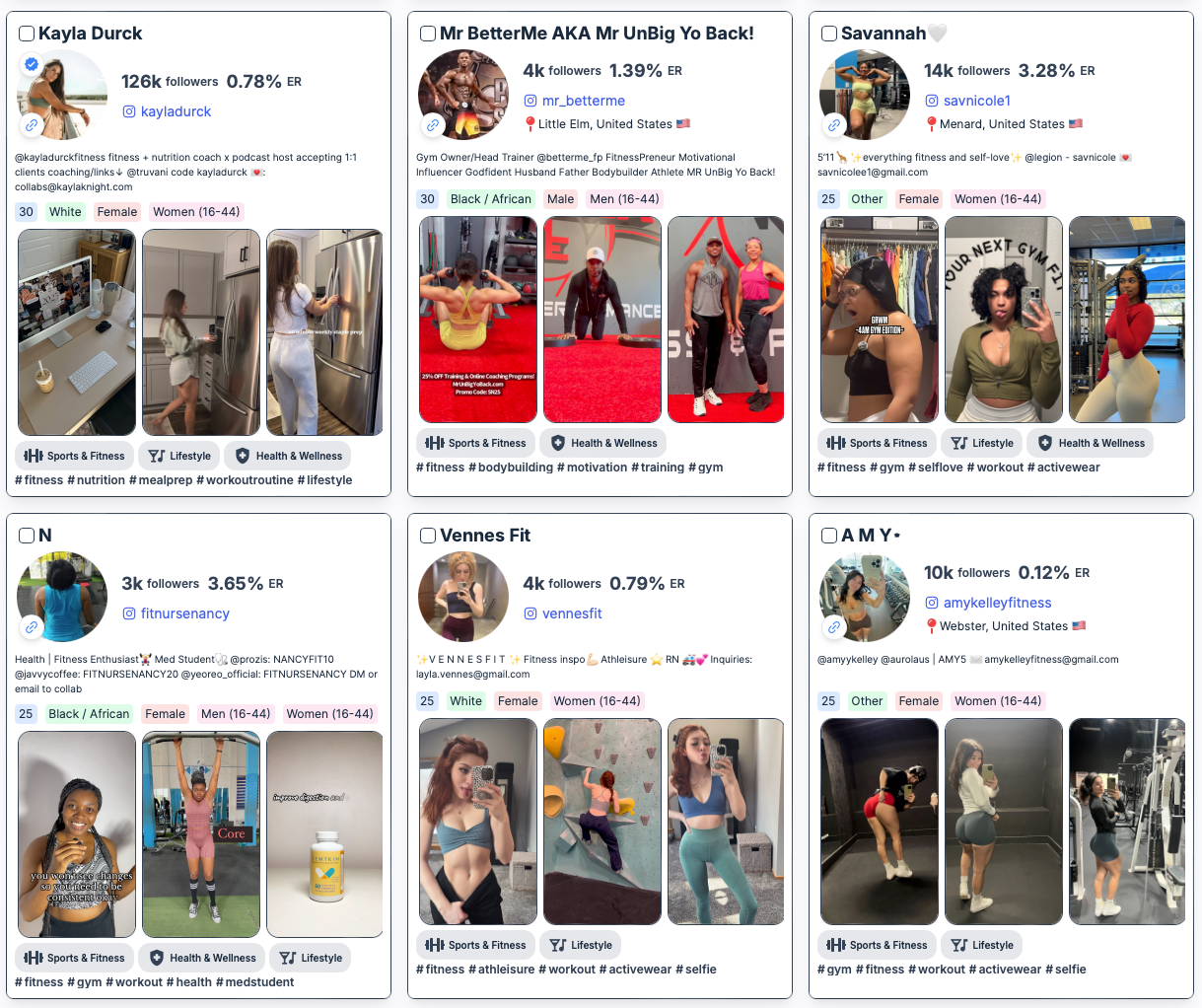
How to find micro-influencers for FREE
Many brands start here. It’s a great way to experiment and potentially make influencer connections without spending much money. However, it is VERY time-consuming and can be discouraging, so if you can afford to join an influencer platform, it’s probably worth the investment. Whichever method you choose, we recommend also running the micro influencer's name through a free people finder tool so you can find all their social media and contact info at once, as well as any possibly damaging info about them before you offer to partner.
1. Leveraging social media platform features–search and hashtags
Time: Very time-consuming
Effort: High effort.
Cost: Free
One way to find micro-influencers for free is to use the in-app search and hashtag features on your social media platform of choice. There are a few different ways to find hashtags to search.
For example, here’s how to find micro-influencers on Instagram or TikTok:
- Identify what hashtags people use in your niche? For example, if you want to find fashion influencers, you’d probably start with something like #styleinspo or #fashionblogger. Make a list of terms. Then, type each into the search bar on Instagram or TikTok and see who pops up.
- As you’re typing, use the related terms the app suggests.
- Check what hashtags other influencers in your niche use. There may be some you hadn’t considered.
- Don’t forget to search outside of Instagram and TikTok, too. Forums where influencers swap tips can help you save time coming up with hashtag search ideas.
Here’s what it looks like to find micro-influencers on Instagram:
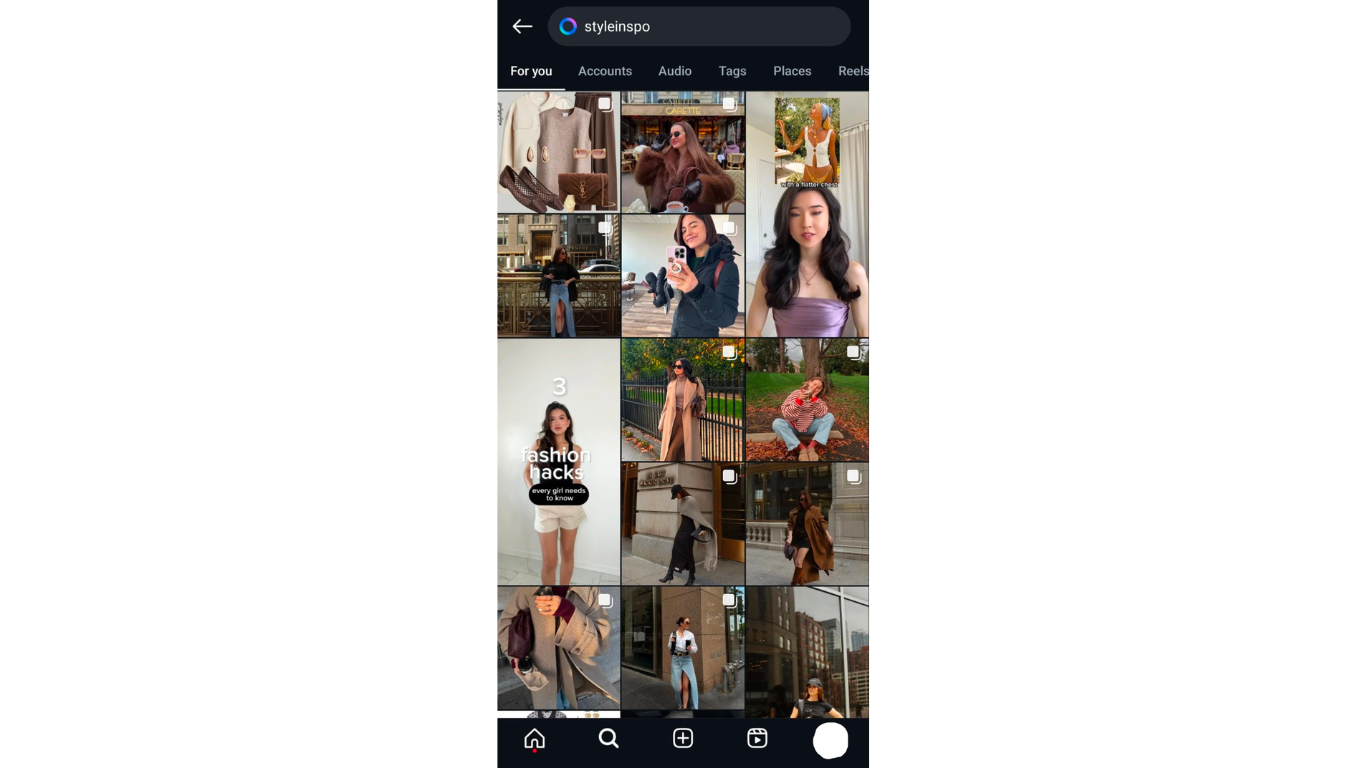
Once you find influencers you fancy, you'll need to know how to reach out to micro-influencers. Unfortunately, an average of 1% of influencers respond to cold outreach messages. So, you’ll repeat this process several times before negotiating a successful collaboration.
It’ll save time and frustration if you compile a list of possible leads with any contact info you can find, then set aside some time to send emails and DMs asking to collaborate. Spend time cultivating relationships with each one by engaging with their posts and giving shout-outs where appropriate before you ask them to collaborate. And be sure to check out the tips in our article above to further increase your chances of receiving a response.
This is the most classic option for how to find micro-influencers on TikTok and Instagram, but there are other ways to find micro-influencers for free. Let’s explore them. ⬇️
2. Explore niche communities and forums–online and in-person
Time: Very time-consuming
Effort: High effort.
Cost: FREE
Where are people talking about your niche? Find out and see what conversations they’re having. You’ll find a few micro-influencers busy building their brand in the process.
- For every niche: Check Reddit and Quora threads related to your industry. Also, check influencer communities on social media sites like Facebook and LinkedIn.
- For food & drink: Check Pinterest, food blogs, recipe sites, and YouTube comments sections. Filter for relevant food types and audiences.
- For health & wellness: Check popular YouTube channels and online magazine comments.
- For book authors: Check groups and reviews on Goodreads and StoryWorthy.
You don’t have to limit your research to online forums. Coffee shops, libraries, local shops, and some community centers host events for people interested in specific topics. See if there are any in your area!
3. Go to networking events–online and in-person
Time: 3 hours-3 days
Effort: Medium-high effort.
Price: Free-$1,000+, depending on the event.
There are many influencer networking events, and micro-influencers go to them. You can find online and in-person options.
Here are some places to try to find micro-influencers at a networking event:
- Find a conference related to social media micro-influencers or digital advertising you’d like to attend. Conferences often cost something, but you’ll make great connections. Some are in-person, but others are online-only.
- Search event websites like Eventbrite to find events in your area or online.
- Look for events related to your niche, not just “influencing” events.
- Check with local shop owners and chambers of commerce to see if they’ve sponsored any networking events for businesses and influencers in your area.
4. See who your competition is hiring
Time: 1-2 hours
Effort: Medium effort
Cost: FREE
Spying on what your competitors are doing (in an ethical way, of course) can be a great way to find micro-influencers in your niche. There are a few ways to do this:
- Use your competition’s name and hashtags when searching on Instagram and TikTok. See who pops up in sponsored posts.
- Use Meta Ads Library or TikTok Ads Library to see what ads your competition is running and who’s in them.
- Use Google image search to see if you can figure out WHO any unnamed people are in their posts, ads, and testimonial pages.
5. Check your customer/follower base
Time: 30 minutes+
Effort: Low effort
Cost: FREE
Some of your best advocates are your already-existing customers. Check who follows you on social media and your customer database–a few may be micro-influencers. Reach out and see if they’re interested in collaborating.
Tips on finding local influencers
If you need to know how to find local influencers, here are a few tips:
- Attend local events. Do everything you can to be where influencers gather. If they’re related to your niche and/or influencer marketing, that's even better.
- Offer influencer perks. Consider giving away free merchandise or access to local influencers and publicizing it on your website and social media.
- Create an Instagram or TikTok-worthy backdrop. One of the easiest ways to find local influencers is to create a small space they can use to make content. Perhaps you could create a mural outside your building or buy an oversized mirror for selfies. Encourage people to tag your business in their posts, and pay attention to who tags you.
- Host a meetup. Create a fun, exclusive event for influencers in your area. Give them after-hours access and make it a party!
Cost analysis: in-house vs. outsourced influencer searching
All the options in this section are DIY, “free” options. But, of course, anything that takes you or an employee’s time isn’t *actually* free. Sometimes, outsourcing the search process to a micro-influencers platform can be cheaper than using these “free” methods.
Say your business makes $20,000 per year, but you only work on it an average of 10 hours per week. At that rate, you’re making close to $40 per hour. If you spend two hours a week finding influencers for “free,” that’s costing you $80 a week.
Even if you decide to increase your weekly hours to 12 instead of 10 to cover the extra workload, you’re still making close to $35 per hour and, therefore, “spending” about $70 per week to find micro-influencers. That adds up quickly.
Of course, it’s not actual money out of your pocket. But anything you can do to make the process more precise and efficient will help you make more money in the long run.
In contrast, Social Cat starts at $99/month. And with the time you’ll save finding influencers who fit your brand and will respond, it’s usually a better deal than doing it all by yourself.
How to find micro-influencers for your brand using influencer discovery tools
The easiest and quickest way to find micro-influencers is to use micro-influencer platforms like Social Cat. The main advantages of using paid influencer software are you can search for niche micro-influencers fast using filters and manage all your influencer campaign from the same platform. You can also post your influencer campaigns, and influencers apply to join.
Let’s start by talking about how to use the search functionality on Social Cat. Let’s say you want to find beauty influencers on Instagram. You’d log into Social Cat and filter by “beauty” to search through our micro-influencer database.
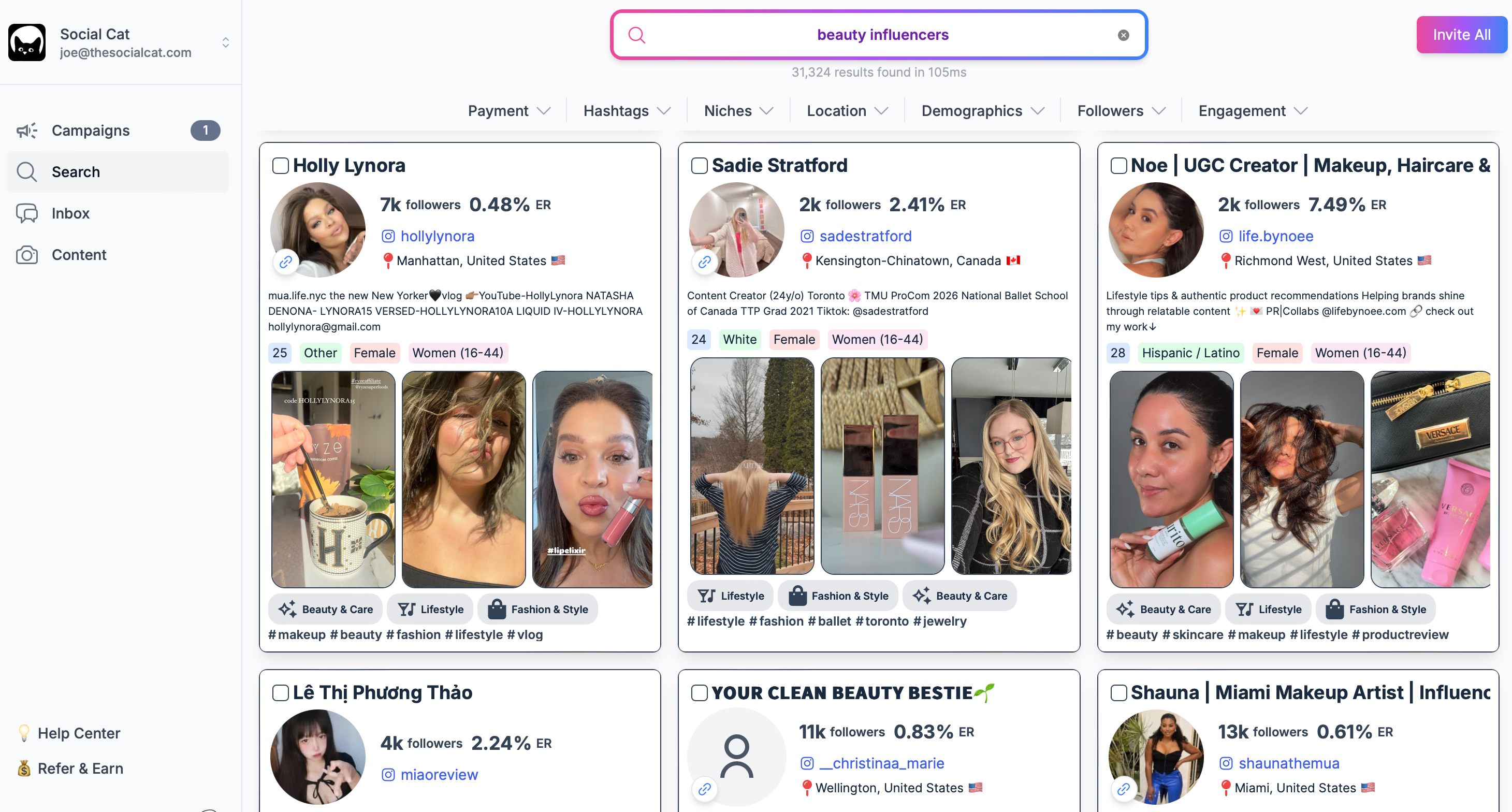
Viola! Suddenly, the only results you’d see are people in your niche.
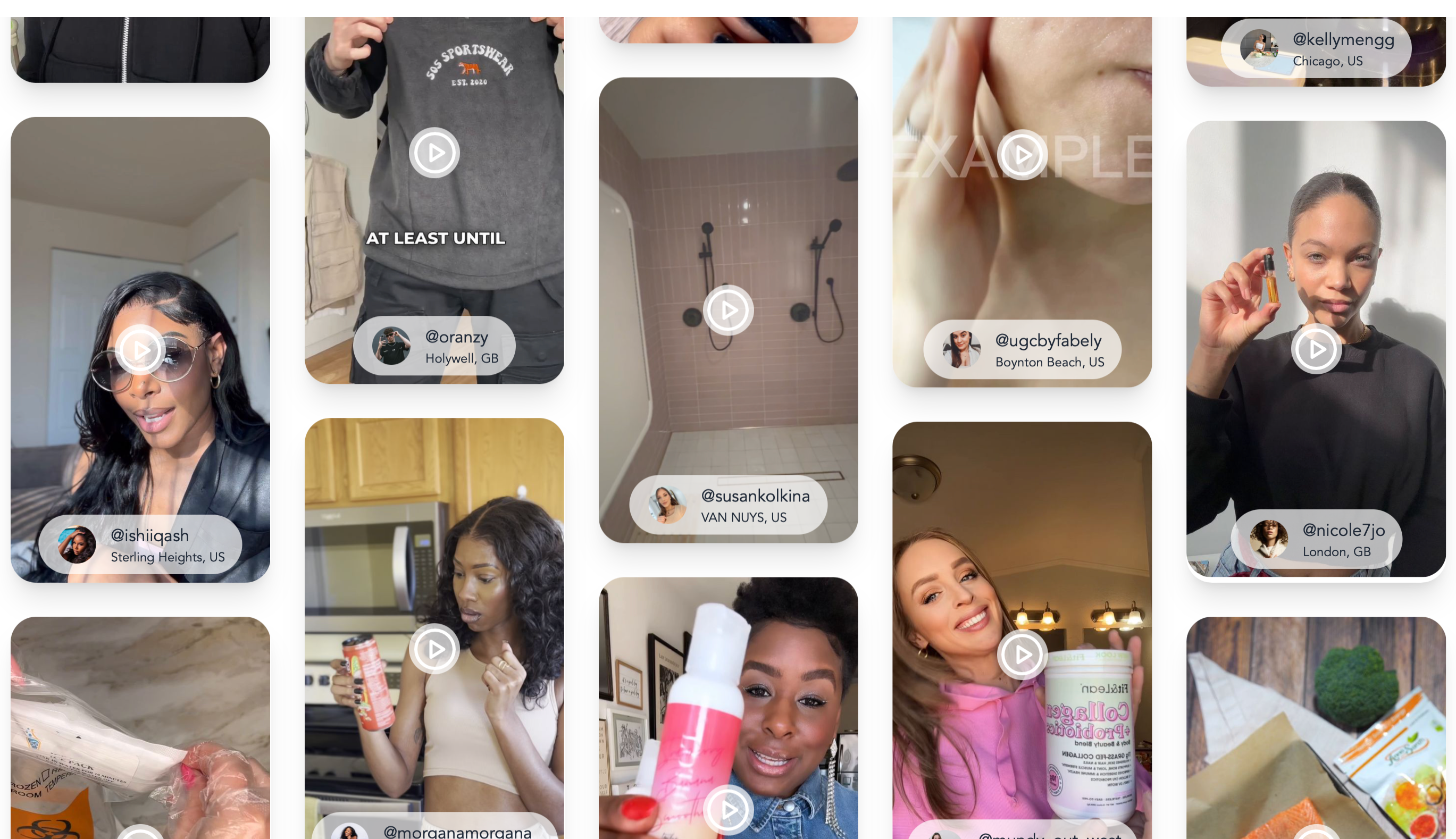
You can use more filters to narrow your search results by country, type of collaboration, content type, and more.
Of course, if you have a vision for an influencer marketing campaign, you can post a campaign, and micro-influencers can apply to work with you. This saves a lot of time.
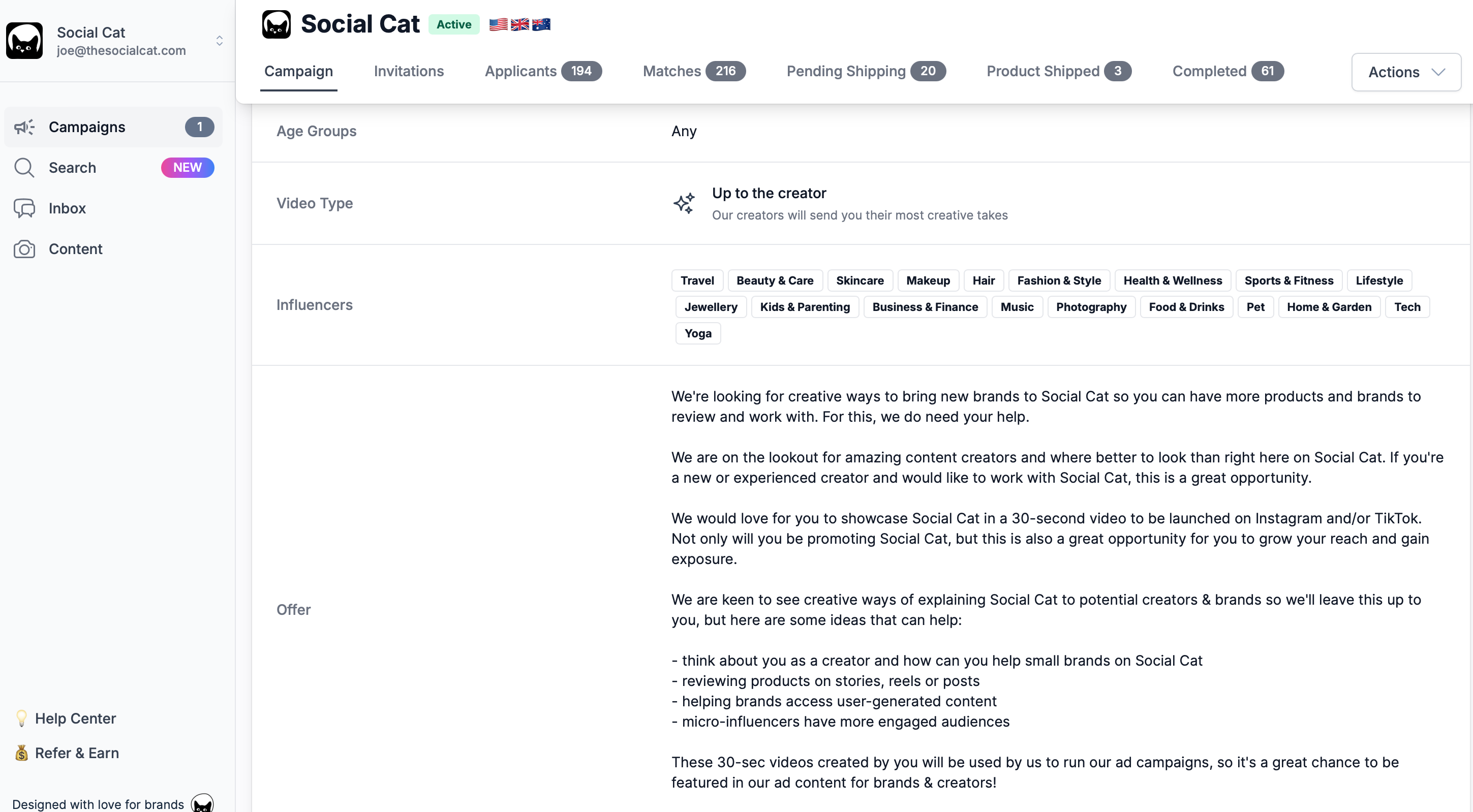
A bonus from our team
The FREE methods we mentioned above will take you so much time– time that, as a business owner, you don’t have. Your other work will suffer while you chase down micro-influencers, or you’ll give up because it’s “too much of a hassle.” You won’t be able to grow your influencer marketing program because you’ll struggle to find the best influencers for your brand.
We have good news. Since you’ve read this far, we have a bonus for you: 50% off your first month on Social Cat–the best micro-influencer platform.
Interested? Then start a free trial, and use the code MICRO50 as checkout.
It doesn’t get better than this: A free trial AND 50% off your first month. Book the free trial onboarding call with one of our experts so they can show you around and answer any questions you have about micro-influencer marketing. But, FYI– our platform is super easy to use, so you won’t need to talk to us to get started.
How to choose the right influencers for your brand?
This is one of the most important things to get right. After all, any micro-influencer will give you some exposure. But the BEST ones for your brand will drive sales and engagement.
It’s worth taking the time to get it right. Before you pick micro-influencers for your next campaign, consider the following:
- What’s your goal for this campaign? Is it brand awareness, engagement, or sales? This will influence the kind of content you want and which micro-influencer will work best.
- What’s their engagement rate? For Instagram micro-influencers, a reasonable engagement rate is between 3% and 7%. For TikTok micro-influencers, it’s more like 5% - 12%.
- Do they have fake followers? Do you see evidence of follow-for-follow loops? At Social Cat, we check for this before we allow influencers to join our platform. But it’s still a good idea to double-check.
- What’s their niche? Does it match yours?
- What type of collaboration are you hoping to do? Gifted, affiliate, paid? Does the influencer do that kind of collab?
- Where do they make content, and is that where your customers are spending time?
- Where do they live? Do they look and talk like your customers?
Using a platform like Social Cat, where micro-influencers sign up to connect with brands, increases your chances of getting a response when you reach out. Doing the following can also increase your chances of getting a response:
- Engage before reaching out. They’re more likely to respond if you already have a positive relationship with them, so leave comments on their posts, give them shout-outs when you can, and nurture the relationship before you email them.
- Keep your message short, friendly, and to-the-point.
- Explain that you want to collaborate (make sure they know you’re not trying to sell them something).
- Give them a heads-up on the type of collaboration you hope to do (gifted, paid, or affiliate).
- Follow-up if you don’t receive a response from them within 1-3 days. Keep following up for a few weeks if needed.
Conclusion
That’s it–the best advice we have on how to find micro-influencers for free or using paid influencer apps. If you’re hoping to do it for free, there are options, like searching hashtags, stalking your competition, and going to events. You can find local influencers by participating in community events and hosting your own.
But all those options cost time. So, it’s worth investing in a micro-influencer platform like Social Cat for most business owners. Using a website to find influencers saves time, effort, and money.
Once you find micro-influencers you’d love to collaborate with, know your goals for the campaign so you can pick micro-influencers who will be a good fit for your brand.
Whether you’re looking to find travel influencers, run influencer marketing campaigns easily, or simply choose the best influencer marketing platform for your brand, we hope this article has been helpful.
If you enjoyed this article, you might also enjoy:
- Mini-Guide: How to Find Local Influencers
- How to find the best influencer platform
- How to Become an Influencer
Table of content
- What are micro-influencers, and why work with them?
- Micro-influencers vs Macro-influencers
- How to find micro-influencers for FREE
- 1. Leveraging social media platform features–search and hashtags
- 2. Explore niche communities and forums–online and in-person
- 3. Go to networking events–online and in-person
- 4. See who your competition is hiring
- 5. Check your customer/follower base
- Tips on finding local influencers
- Cost analysis: in-house vs. outsourced influencer searching
- How to find micro-influencers for your brand using influencer discovery tools
- A bonus from our team
- How to choose the right influencers for your brand?
Looking for influencers?
Table of content
- What are micro-influencers, and why work with them?
- Micro-influencers vs Macro-influencers
- How to find micro-influencers for FREE
- 1. Leveraging social media platform features–search and hashtags
- 2. Explore niche communities and forums–online and in-person
- 3. Go to networking events–online and in-person
- 4. See who your competition is hiring
- 5. Check your customer/follower base
- Tips on finding local influencers
- Cost analysis: in-house vs. outsourced influencer searching
- How to find micro-influencers for your brand using influencer discovery tools
- A bonus from our team
- How to choose the right influencers for your brand?










